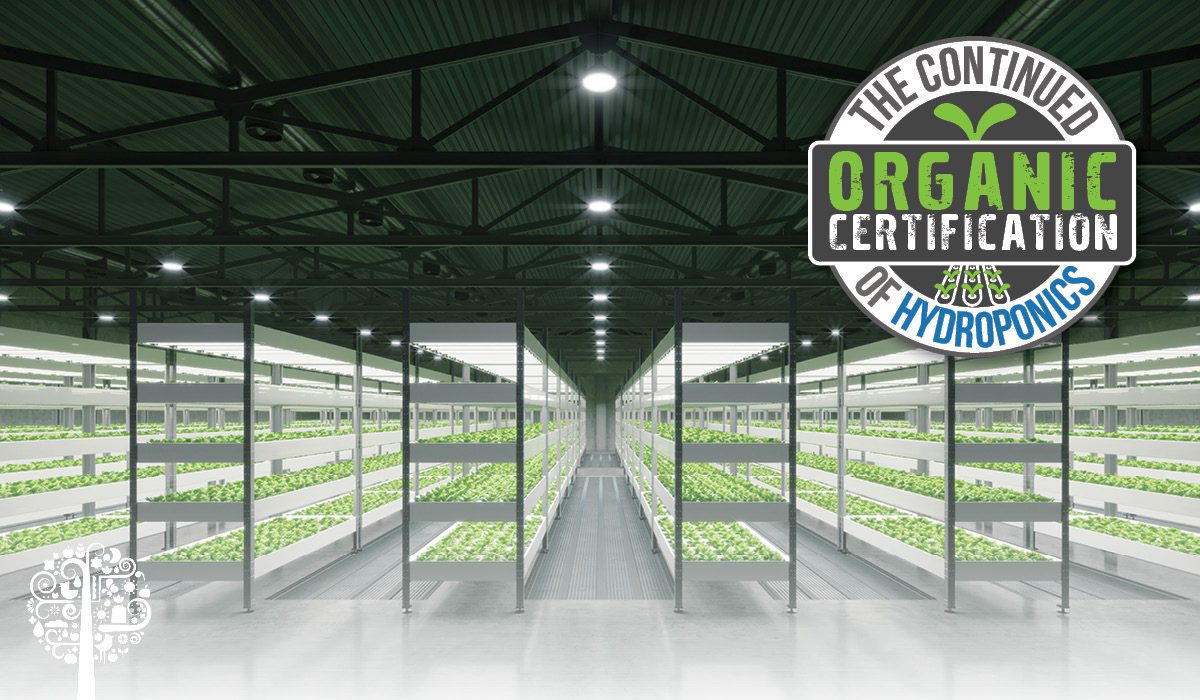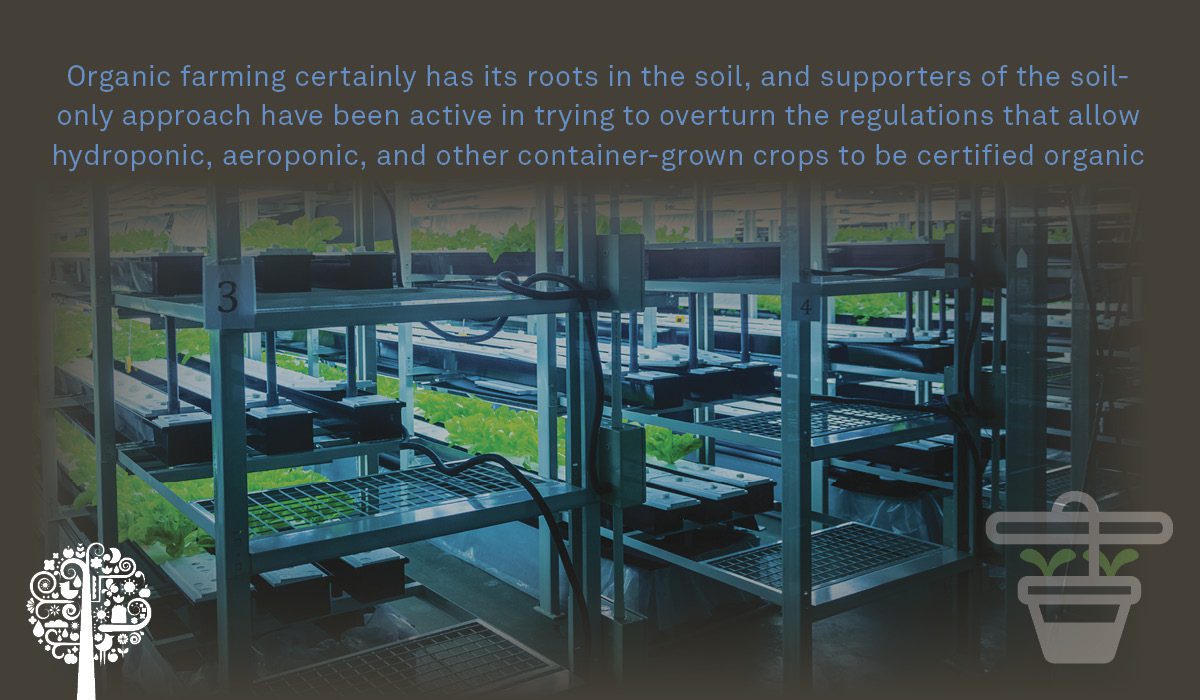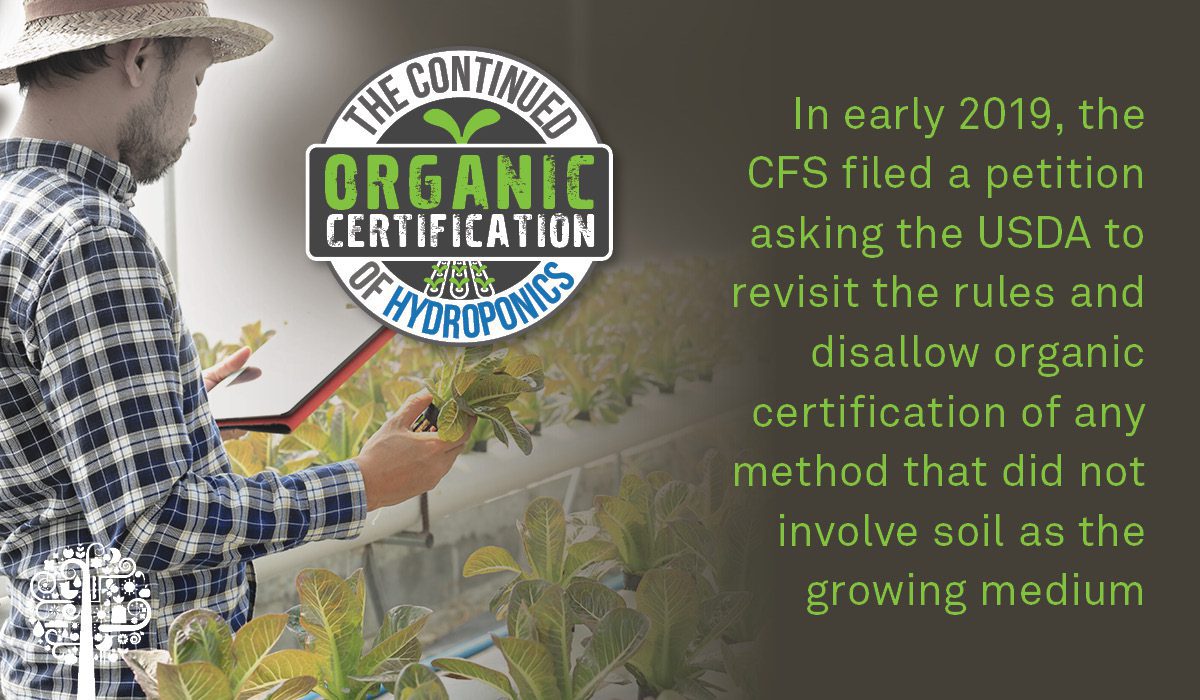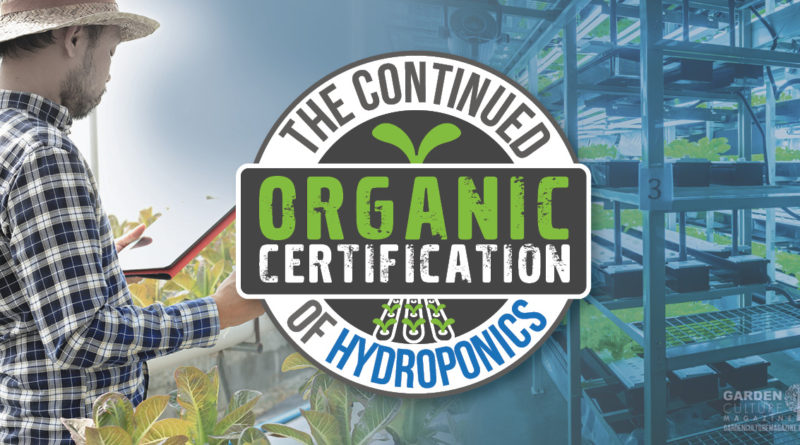The Continued Organic Certification of Hydroponics
Ever since the Organic Foods Production Act (OFPA) of 1990 established the National Organic Program (NOP) in the U.S., there has been trouble brewing. Two kinds of passionate growers have been pitted against one another on whether or not hydroponically-grown produce, and more generally, container-grown produce, qualifies as organic under the standards established by the NOP. Organic farming certainly has its roots in the soil, and supporters of the soil-only approach have been active in trying to overturn the regulations that allow hydroponic, aeroponic, and other container-grown crops to be certified organic. Organic growers are opposed for both economic and environmental reasons.
Some Traction
It looked like the organic faction might get some traction when in 2017, the National Organic Standards Board (NOSB), a volunteer advisory committee to the USDA, voted 14-0 with one abstention in favor of barring certification of aeroponic systems. The board voted to continue allowing hydroponics certification, although it was close, with an 8-7 vote. To the chagrin of soil-based organic growers, the USDA chose to maintain certification of both hydroponic and aeroponic production systems if they met the NOP requirements. That wasn’t the end of it as far as the Center for Food Safety (CFS) was concerned.
Revisiting The Rules
In early 2019, the CFS filed a petition asking the USDA to revisit the rules and disallow organic certification of any method that did not involve soil as the growing medium. The USDA reiterated its stand on the matter and denied the petitioner’s request. So, in March of 2020, the CFS, with a group of organic farmers as co-plaintiffs, took its case to the Northern District of California, asking the court to force the USDA to take up once again the issues brought up in the petition of 2019, and to overturn the decision to allow organic hydroponics. Feeling they had a pretty good case wherein the basic facts were not in dispute, the plaintiffs requested a court’s summary judgment. This meant that a judge would hear what the lawyers had to say, consider the facts, think about it for a while, and render a decision. The summary judgment hearing took place on January 21, 2021, with Judge Richard Seeborg presiding.

The plaintiffs based their arguments on technical matters involving the denial of their petition by the USDA, the requirement for soil to be a part of organic agriculture according to the regulations, and the economic harm done to established organic growers who have to compete against hydroponic producers. The USDA attorney claimed that crops grown hydroponically do not use soil, so any references to soil-based agriculture in the regulations do not apply. Judge Seeborg stated he saw no reason to interpret the 1990 OFPA in such a way as to exclude any process simply because it does not involve soil. Judge Seeborg ended the proceedings after about an hour to take the matter under consideration.
The Ruling
In cases like this, judges take anywhere from a few weeks to a few months before issuing a written ruling. Judge Seeborg did not come across as being very sympathetic to the views of the CFS and co-plaintiffs. It looked promising for supporters of organic hydroponic, aeroponic, and container-grown agriculture.

Fifty-seven days after the summary hearing, Judge Seeborg issued his ruling in favor of the USDA’s defense of its procedures and interpretations of the OFPA. Seeborg, in his opinion, admitted that some of the claims made by the CFS concerning the wording of the regulations regarding “soil” possessed a certain logic, but it wasn’t enough to sway him. What it boiled down to was that the USDA was not in error in the way it reviewed and denied the CFS petition to revisit organic certification of hydroponics; that the regulations as they apply to soil, soil conservation, and manuring do not apply when soil is not being used; and, that the law makes no mention of prohibiting soilless culture. One might think that would finally put an end to it.

Not surprisingly, the CFS disagrees with Judge Seeborg’s interpretation of the law. On January 12, 2021, the CFS filed a new action, demanding that the USDA prohibit hydroponic operations from using the organic label. It seems like asking for a re-do is the only way forward for proponents of the ban.
References
Judge Unlikely to Ban Hydroponic Crops From Organic Label. Courthouse News Service. courthousenews.com/judge-unlikely-to-ban-hydroponic-crops-from-organic-label. Web. Accessed 28 January, 2021.
ORDER GRANTING DEFENDANTS’ MOTION FOR SUMMARY JUDGMENT; DENYING PLAINTIFFS’ CROSS MOTION, AND DENYING PLAINTIFFS’ MOTION TO COMPLETE THE ADMINISTRATIVE RECORD. coalitionforsustainableorganics.org/wp-content/uploads/2021/03/CSA-Decision-3-19-21.pdf. Web. Accessed 23 February, 2021.
CENTER FOR FOOD SAFETY FILES LEGAL ACTION TO PROHIBIT HYDROPONICS FROM ORGANIC. centerforfoodsafety.org/press-releases/5501/center-for-food-safety-files-legal-action-to-prohibit-hydroponics-from-organic. Web. Accessed 23 February, 2021.




